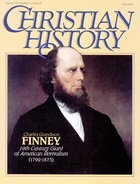Ministers, he said, should always avoid levity and “all winking and roguishness,” should be grave but not morose, dignified but not sanctimonious. “Where ministers hold out the idea that they are the great ones of the earth they create a false impression of religion.” “A minister should be polite and considerate, should observe unusual personal kindness.” “Good manners [are] benevolence acted out, bad manners, selfishness acted out.” Ministers, of all people, he insisted, must avoid slovenliness, affectation, effeminacy, coarseness and vulgarity, selfishness, impertinence, and a spirit of contradiction. They should beware of “band box manners” and of anything “foppish.” They should not wear ruffles, rings, breast pins, beards and whiskers (This was in 1843, before he took to wearing them himself.), and they should not carry gaudy pocket hankershiefs. Evidently much more needed and occupying much more time in his talks were warnings against vulgarity and coarseness. They should not blow their noses with their fingers; they should not use a dirty hankerchief; they must not spit on the carpet; they must not put their feet and muddy boots on the sofa or on the door jams, nor pull off their stockings before a family! He related the story of a young clergyman who “called on some ladies after walking some distance, took off his boots and hung his socks on the andirons the first thing,” and he told of another ministerial acquaintance who “put his feet up in a window in a ladies parlor to enjoy the cool air!” He advised the embryo preachers to keep their nails cleaned and pared and their teeth clean. It was disgusting, he said, “in anxious meetings to be obliged to smell the breath of a filthy mouth.” At table, he reminded them, they were not supposed to cut their meat with their pocket knives nor wipe their mouths on the table cloth!
Copyright © 1988 by the author or Christianity Today/Christian History magazine.
Click here for reprint information on Christian History.

Support Our Work
Subscribe to CT for less than $4.25/month





























